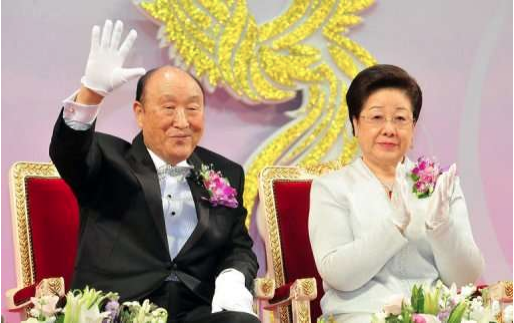GAPYEONG, South Korea (AFP) - Thousands of tearful, flower-carrying mourners descended Thursday on the South Korean headquarters of the Unification Church to offer prayers to their late "messiah" Sun Myung Moon.
Men clad in black suits and women in white dresses flooded the church's main compound in Gapyeong, 60 kilometres (35 miles) east of Seoul, at the start of a 10-day wake ahead of Moon's funeral on September 15.
Moon, the self-styled messiah who founded the church famed for its mass weddings and business empire spanning cars to sushi, died Monday at the age of 92 due to complications from pneumonia.
From early morning, buses ferried mourners -- including a large number of Japanese -- into the sprawling, mountain-ringed Gapyeong complex where a special altar bearing a giant portrait of a youthful-looking Moon had been erected inside a cavernous, covered stadium.
They offered roses and lilies -- Moon's favourite flowers -- and bowed before the portrait ringed with roses.
The altar was flanked by the flags of South Korea, Japan, the United States and other countries, as well as floral tributes from prominent figures including South Korean President Lee Myung-Bak.
The atmosphere was sombre but calm, as Hyung-Jin Moon, Moon's youngest son and successor as church leader, received the mourners, who included women with infants in strollers.
Many wept quietly as solemn music played in the background.
"I feel even sadder than when my own parents died... I'd never thought the true father would leave us so soon," Park Mal-Rye told AFP, wiping tears from her face.
"Our church has always been vilified and cornered by Christians. But now the father's death will shed more light on his accomplishments and help our church grow further," said Park, a follower for the past 20 years.
Bo Hi Pak, Moon's close aide, urged church members to rally behind Moon's two sons and his wife to continue their founder's legacy.
"The father told us not to cry and not to show sorrow when he's gone, so everyone's trying hard to follow his words," he told AFP before bursting into tears. "But we're too devastated."
Hundreds of students from church-owned schools and dancers from a church-run ballet troupe were among those who paid tribute at the altar, under a giant banner reading: "Sun Myung Moon: The true parent of heaven, earth and humankind."
Some took the opportunity for a "pilgrimage" tour of the 1,000-hectare (2,500 acre) Gapyeong estate, including the vast White House-modelled mansion where Moon's body lay in state in a glass-topped coffin.
Only senior church members and specially invited mourners were allowed to view the coffin, which was off limits to the general public.
The scenic estate, which overlooks a large lake, houses a host of modern facilities, including schools, training centres and a hospital where Moon was treated in the last days of his life.
More than 150,000 mourners from South Korea and abroad, including 32,000 from Japan, are expected to pay their respects over the next 10 days, they added.
Following a personal condolence message from North Korean leader Kim Jong-Un, there had been speculation that Pyongyang might send a rare delegation to the South to attend the September 15 funeral.
But a senior church official said Thursday that Pyongyang had decided to stay away, amid lingering resentment over a recent South Korean-US military drill.
"When I was in the North, I was told by the officials there that there would be no funeral delegation to visit the South," said Park Sang-Kwon, president of an automaking joint venture the church established in North Korea in 1999.
"They said the North still had hard feelings... and it may be inappropriate for them to send the delegation after criticising the South so much in recent weeks," he said.
Pyongyang had denounced the August 20-31 computer-assisted simulation exercise, named Ulchi Freedom Guardian, as a provocative rehearsal for war.
Although a staunch anti-communist, Moon began building a relationship with North Korea in the 1990s. In 1991 he visited Pyongyang and met with then leader Kim Il-Sung for talks that touched on reunification of the divided peninsula.





